卓别林英语演讲稿
- 格式:doc
- 大小:18.00 KB
- 文档页数:1
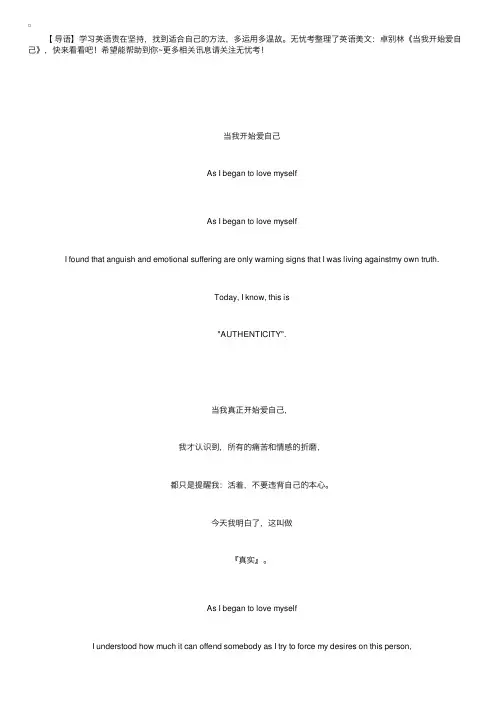
【导语】学习英语贵在坚持,找到适合⾃⼰的⽅法,多运⽤多温故。
⽆忧考整理了英语美⽂:卓别林《当我开始爱⾃⼰》,快来看看吧!希望能帮助到你~更多相关讯息请关注⽆忧考!当我开始爱⾃⼰As I began to love myselfAs I began to love myselfI found that anguish and emotional suffering are only warning signs that I was living againstmy own truth.Today, I know, this is"AUTHENTICITY".当我真正开始爱⾃⼰,我才认识到,所有的痛苦和情感的折磨,都只是提醒我:活着,不要违背⾃⼰的本⼼。
今天我明⽩了,这叫做『真实』。
As I began to love myselfI understood how much it can offend somebody as I try to force my desires on this person,even though I knew the time was not right and the person was not ready for it,and even though this person was me.Today I call it"RESPECT".当我真正开始爱⾃⼰,我才懂得,把⾃⼰的愿望强加于⼈,是多么的⽆礼,就算我知道,时机并不成熟,那⼈也还没有做好准备,就算那个⼈就是我⾃⼰,今天我明⽩了,这叫做『尊重』。
As I began to love myselfI stopped craving for a different life,and I could see that everything that surrounded me was inviting me to grow.Today I call it"MATURITY".当我开始爱⾃⼰,我不再渴求不同的⼈⽣,我知道任何发⽣在我⾝边的事情,都是对我成长的邀请。
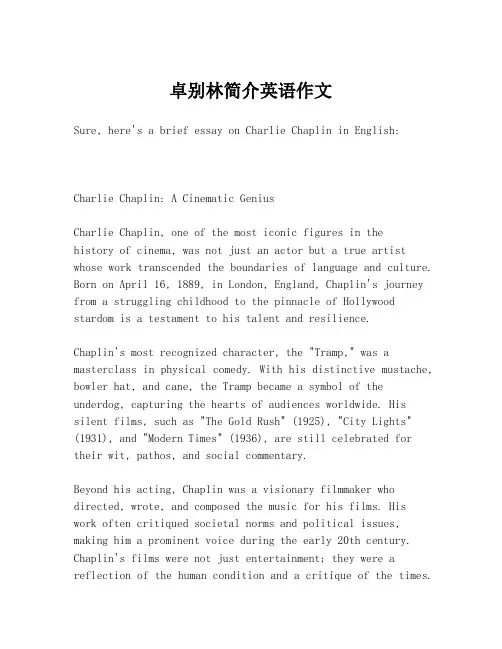
卓别林简介英语作文Sure, here's a brief essay on Charlie Chaplin in English:Charlie Chaplin: A Cinematic GeniusCharlie Chaplin, one of the most iconic figures in thehistory of cinema, was not just an actor but a true artist whose work transcended the boundaries of language and culture. Born on April 16, 1889, in London, England, Chaplin's journey from a struggling childhood to the pinnacle of Hollywood stardom is a testament to his talent and resilience.Chaplin's most recognized character, the "Tramp," was a masterclass in physical comedy. With his distinctive mustache, bowler hat, and cane, the Tramp became a symbol of the underdog, capturing the hearts of audiences worldwide. His silent films, such as "The Gold Rush" (1925), "City Lights" (1931), and "Modern Times" (1936), are still celebrated for their wit, pathos, and social commentary.Beyond his acting, Chaplin was a visionary filmmaker who directed, wrote, and composed the music for his films. His work often critiqued societal norms and political issues, making him a prominent voice during the early 20th century. Chaplin's films were not just entertainment; they were a reflection of the human condition and a critique of the times.Despite facing political scrutiny and being accused of communist sympathies during the Red Scare in the 1950s, Chaplin's legacy remains untarnished. He returned to the United States in 1972 to receive an honorary Academy Award, a fitting recognition for his lifelong contribution to film.Chaplin's influence on cinema is immeasurable. He pioneered the art of combining comedy with drama, creating a unique style that has been emulated but never replicated. His films continue to be studied and enjoyed, serving as a reminder of the power of cinema to entertain, enlighten, and inspire.In conclusion, Charlie Chaplin was more than just a comic actor; he was a creative powerhouse whose work has left an indelible mark on the world of film. His life and career stand as a shining example of the impact one individual can have on the cultural landscape, and his films continue to be a source of joy and insight for generations of movie lovers.。
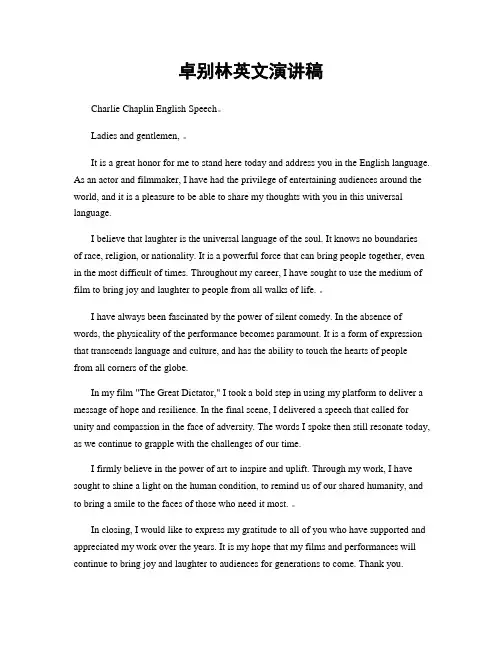
卓别林英文演讲稿Charlie Chaplin English Speech。
Ladies and gentlemen, 。
It is a great honor for me to stand here today and address you in the English language. As an actor and filmmaker, I have had the privilege of entertaining audiences around the world, and it is a pleasure to be able to share my thoughts with you in this universal language.I believe that laughter is the universal language of the soul. It knows no boundariesof race, religion, or nationality. It is a powerful force that can bring people together, even in the most difficult of times. Throughout my career, I have sought to use the medium of film to bring joy and laughter to people from all walks of life. 。
I have always been fascinated by the power of silent comedy. In the absence of words, the physicality of the performance becomes paramount. It is a form of expression that transcends language and culture, and has the ability to touch the hearts of people from all corners of the globe.In my film "The Great Dictator," I took a bold step in using my platform to deliver a message of hope and resilience. In the final scene, I delivered a speech that called for unity and compassion in the face of adversity. The words I spoke then still resonate today, as we continue to grapple with the challenges of our time.I firmly believe in the power of art to inspire and uplift. Through my work, I have sought to shine a light on the human condition, to remind us of our shared humanity, and to bring a smile to the faces of those who need it most. 。
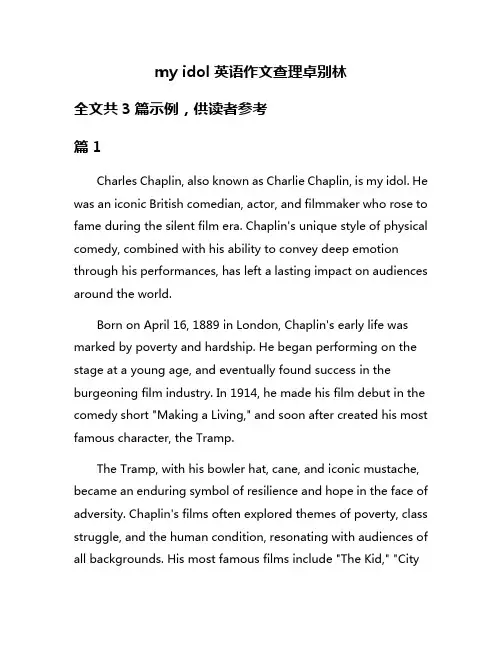
my idol英语作文查理卓别林全文共3篇示例,供读者参考篇1Charles Chaplin, also known as Charlie Chaplin, is my idol. He was an iconic British comedian, actor, and filmmaker who rose to fame during the silent film era. Chaplin's unique style of physical comedy, combined with his ability to convey deep emotion through his performances, has left a lasting impact on audiences around the world.Born on April 16, 1889 in London, Chaplin's early life was marked by poverty and hardship. He began performing on the stage at a young age, and eventually found success in the burgeoning film industry. In 1914, he made his film debut in the comedy short "Making a Living," and soon after created his most famous character, the Tramp.The Tramp, with his bowler hat, cane, and iconic mustache, became an enduring symbol of resilience and hope in the face of adversity. Chaplin's films often explored themes of poverty, class struggle, and the human condition, resonating with audiences of all backgrounds. His most famous films include "The Kid," "CityLights," and "Modern Times," which are still considered classics of cinema today.In addition to his work as an actor and filmmaker, Chaplin was also a talented composer and director. He wrote the music for many of his films, and his innovative approach to storytelling and cinematography helped to revolutionize the art of filmmaking.Beyond his artistic talents, Chaplin was also a humanitarian and political activist. He used his fame and influence to speak out against social injustices, and was a vocal critic of fascism and totalitarianism. In 1940, he released "The Great Dictator," a satirical film that lampooned Adolf Hitler and called for peace and understanding among nations.Chaplin's career was not without controversy, however. In the 1950s, he was accused of being a Communist sympathizer during the height of the McCarthy era, and was eventually forced to leave the United States. Despite these challenges, Chaplin continued to make films and perform on stage until his death in 1977.For me, Charlie Chaplin is more than just a talented actor and filmmaker. He is a symbol of hope, resilience, and the power of art to transcend boundaries and bring people together. Hisfilms have inspired generations of artists, and his impact on popular culture is still felt today.In conclusion, Charlie Chaplin will always be my idol. His timeless performances, innovative storytelling, and commitment to social justice continue to resonate with audiences around the world. I am grateful for the legacy that he has left behind, and I am inspired by his ability to bring joy and laughter to people of all ages. Thank you, Charlie Chaplin, for being a shining example of creativity and compassion in a world that often feels dark and uncertain.篇2Charlie Chaplin, also known as my idol, was a legendary comedian, actor, and filmmaker who left a lasting impact on the world of cinema. With his iconic character, the Tramp, Chaplin entertained audiences worldwide and became one of the most beloved and influential figures in the history of film.Born on April 16, 1889, in London, England, Chaplin had a difficult childhood marked by poverty and hardship. His father was absent, and his mother struggled to support him and his older half-brother Sydney. Despite these challenges, Chaplindiscovered his love for performing at a young age and began a career in show business as a child actor.Chaplin's big break came when he was cast in the Keystone comedy film, "Making a Living," in 1914. From there, he went on to create some of his most iconic and enduring films, including "The Kid," "City Lights," "Modern Times," and "The Great Dictator." Chaplin's films were known for their humor, wit, and social commentary, and he often used his platform to address issues such as poverty, war, and inequality.In addition to his talents as a performer, Chaplin was also a skilled director, writer, and composer. He was involved in all aspects of filmmaking, from scripting and editing to scoring and marketing. His meticulous attention to detail and dedication to his craft set him apart from other filmmakers of his time and solidified his legacy as a true cinematic genius.Chaplin's influence extended beyond the world of film. He was a global celebrity whose image was instantly recognizable, and his popularity transcended cultural and linguistic barriers. Chaplin's timeless humor and universal themes resonated with audiences of all ages and backgrounds, making him a beloved figure around the world.Despite his success and fame, Chaplin remained humble and down-to-earth throughout his life. He was known for his generosity, kindness, and compassion, and he used his wealth and influence to support charitable causes and help those in need. Chaplin's commitment to social justice and his advocacy for the marginalized and disadvantaged continue to inspire generations of artists and activists today.In conclusion, Charlie Chaplin was not just a comedian, actor, and filmmaker – he was a visionary, a trailblazer, and a true pioneer of his craft. His unique blend of humor, heart, and humanity made him a timeless icon whose legacy lives on in the hearts and minds of film lovers everywhere. As a fan and admirer of Chaplin, I am grateful for the joy and inspiration he has brought into my life, and I will always cherish his work and his memory as my idol.篇3Charlie Chaplin, also known as the Tramp, is a legendary figure in the world of cinema and entertainment. He was born on April 16, 1889, in London, England. Chaplin was an actor, comedian, writer, producer, and director, and he is considered one of the most influential figures in the history of film.Growing up in poverty, Chaplin found solace in performing and entertaining others. He began his career as a vaudeville performer before transitioning to film in the early 1910s. Chaplin quickly rose to fame with his iconic character, the Tramp, a lovable and mischievous vagabond with a heart of gold. The Tramp became a symbol of resilience, humor, and kindness in the face of adversity.Throughout his career, Chaplin made over 80 films, many of which he wrote, directed, and produced himself. His innovative use of physical comedy, clever wordplay, and social commentary set him apart from his contemporaries. Chaplin's films often tackled themes of poverty, injustice, and the struggle for human dignity, resonating with audiences around the world.In addition to his work in film, Chaplin was also a talented composer and musician. He composed the music for many of his silent films, adding another layer of emotion and humor to his performances. Chaplin's ability to blend humor, pathos, and social critique in his work is what makes him a true genius of cinema.Despite facing personal and professional challenges throughout his life, Chaplin continued to create groundbreaking and timeless films. His legacy lives on through his films, whichare still watched and celebrated by audiences of all ages. Charlie Chaplin remains an enduring icon and an inspiration to actors, filmmakers, and artists around the world.。
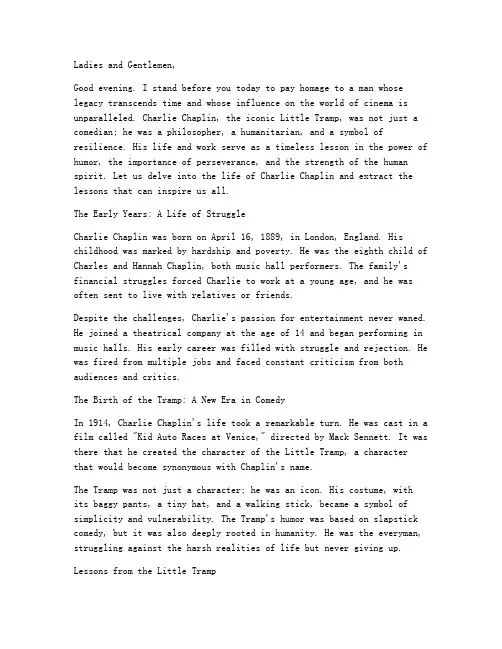
Ladies and Gentlemen,Good evening. I stand before you today to pay homage to a man whose legacy transcends time and whose influence on the world of cinema is unparalleled. Charlie Chaplin, the iconic Little Tramp, was not just a comedian; he was a philosopher, a humanitarian, and a symbol of resilience. His life and work serve as a timeless lesson in the power of humor, the importance of perseverance, and the strength of the human spirit. Let us delve into the life of Charlie Chaplin and extract the lessons that can inspire us all.The Early Years: A Life of StruggleCharlie Chaplin was born on April 16, 1889, in London, England. His childhood was marked by hardship and poverty. He was the eighth child of Charles and Hannah Chaplin, both music hall performers. The family's financial struggles forced Charlie to work at a young age, and he was often sent to live with relatives or friends.Despite the challenges, Charlie's passion for entertainment never waned. He joined a theatrical company at the age of 14 and began performing in music halls. His early career was filled with struggle and rejection. He was fired from multiple jobs and faced constant criticism from both audiences and critics.The Birth of the Tramp: A New Era in ComedyIn 1914, Charlie Chaplin's life took a remarkable turn. He was cast in a film called "Kid Auto Races at Venice," directed by Mack Sennett. It was there that he created the character of the Little Tramp, a characterthat would become synonymous with Chaplin's name.The Tramp was not just a character; he was an icon. His costume, withits baggy pants, a tiny hat, and a walking stick, became a symbol of simplicity and vulnerability. The Tramp's humor was based on slapstick comedy, but it was also deeply rooted in humanity. He was the everyman, struggling against the harsh realities of life but never giving up.Lessons from the Little TrampThe Little Tramp, despite his struggles, remained optimistic and resilient. Here are some of the lessons we can learn from him:1. Resilience in the Face of Adversity: The Little Tramp never succumbed to despair. He faced life's hardships with a sense of humor and determination. We, too, can learn to find strength in adversity and use humor to cope with life's challenges.2. The Power of Simplicity: The Tramp's costume and mannerisms were simple, yet they conveyed a profound message. In a world filled with complexity, we can find solace in simplicity and appreciate the beauty of the mundane.3. Empathy and Compassion: The Little Tramp was often the victim of circumstance, but he never lost his empathy for others. He was a symbol of compassion, always willing to lend a helping hand. We should strive to be as empathetic and compassionate as the Tramp, extending our kindness to those around us.4. The Importance of Individuality: The Tramp's uniqueness set him apart from others. He never tried to conform to societal norms but remained true to himself. This teaches us the importance of embracing our individuality and standing up for what we believe in.5. The Power of Humor: The Little Tramp's humor was a powerful tool for survival. It allowed him to navigate the hardships of life with grace. Humor has the power to heal, bring joy, and connect us with others. We should never underestimate its power.A Humanitarian at HeartCharlie Chaplin was not just a comedian; he was a humanitarian. Hisfilms often addressed social issues of his time, such as poverty, war, and injustice. He used his platform to advocate for peace, human rights, and equality.In 1942, Chaplin directed and starred in "The Great Dictator," a film that mocked and criticized fascism. The film was a bold statementagainst tyranny and a testament to Chaplin's commitment to using his art for a greater cause.Legacy and InfluenceCharlie Chaplin's influence on the world of cinema cannot be overstated. He revolutionized the art of comedy and inspired countless filmmakers and comedians. His films have been celebrated for their timeless appeal and profound messages.Today, we can still find Charlie Chaplin's spirit in the works of modern comedians and filmmakers. His legacy continues to inspire us to find humor in life, to be resilient in the face of adversity, and to use our voices to advocate for a better world.In ConclusionCharlie Chaplin's life and work are a testament to the indomitablespirit of the human race. The Little Tramp, with his baggy pants andtiny hat, has become a symbol of hope, resilience, and humor. Let us remember Chaplin's message: to find joy in life, to fight for what is right, and to never lose sight of our humanity.Thank you, Charlie Chaplin, for leaving us with a timeless lesson in resilience and humor. Your legacy will continue to inspire generations to come.Ladies and Gentlemen, let us rise and give a standing ovation to the master of comedy, the man who taught us that laughter is the best medicine for a broken heart, Charlie Chaplin.。
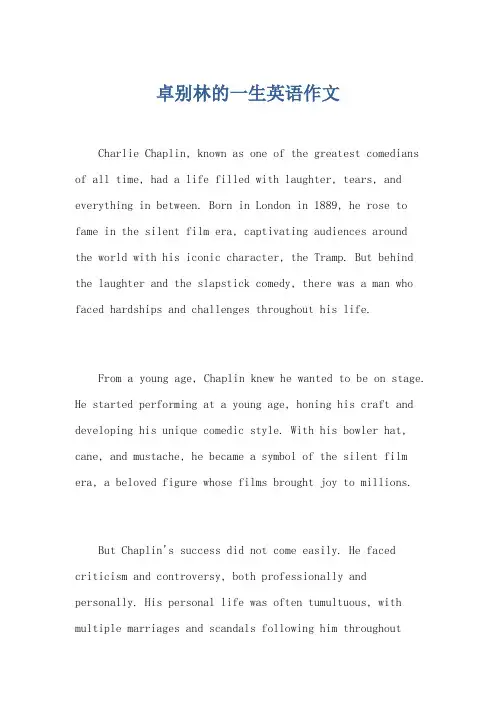
卓别林的一生英语作文Charlie Chaplin, known as one of the greatest comedians of all time, had a life filled with laughter, tears, and everything in between. Born in London in 1889, he rose to fame in the silent film era, captivating audiences around the world with his iconic character, the Tramp. But behind the laughter and the slapstick comedy, there was a man who faced hardships and challenges throughout his life.From a young age, Chaplin knew he wanted to be on stage. He started performing at a young age, honing his craft and developing his unique comedic style. With his bowler hat, cane, and mustache, he became a symbol of the silent film era, a beloved figure whose films brought joy to millions.But Chaplin's success did not come easily. He faced criticism and controversy, both professionally and personally. His personal life was often tumultuous, with multiple marriages and scandals following him throughouthis career. Despite the challenges, Chaplin continued to create groundbreaking films that pushed the boundaries of comedy and storytelling.One of Chaplin's most famous films, "The Great Dictator," was a bold political statement against fascism and tyranny. In the film, Chaplin plays dual roles, a dictator and a Jewish barber, highlighting the absurdity of war and dictatorship. The film's final speech, in which Chaplin calls for unity and peace, remains a powerful and timeless message.Throughout his life, Chaplin remained dedicated to his craft, constantly pushing himself to create new and innovative work. He once said, "A day without laughter is a day wasted," a sentiment that encapsulates his commitment to bringing joy to audiences around the world.In his later years, Chaplin continued to work in film and theater, leaving behind a legacy that continues toinspire generations of comedians and filmmakers. His influence can be seen in the work of artists such as Mel Brooks, Woody Allen, and even contemporary comedians like Jim Carrey.As I reflect on Chaplin's life, I am struck by the resilience and determination he showed in the face of adversity. Despite the challenges he faced, he never lost his sense of humor or his passion for his art. Chaplin's life is a reminder that laughter has the power to transcend boundaries and bring people together, a lesson that is as relevant today as it was in his time.In conclusion, Charlie Chaplin's life was a testament to the power of laughter and the resilience of the human spirit. Through his films and performances, he brought joy to millions and left behind a legacy that continues to inspire and entertain. As I think about Chaplin's life and work, I am reminded of his words: "To truly laugh, you must be able to take your pain and play with it." Chaplin's ability to find humor in the darkest moments is a lessonfor us all, a reminder that laughter can be a source of strength and healing in even the most difficult times.。
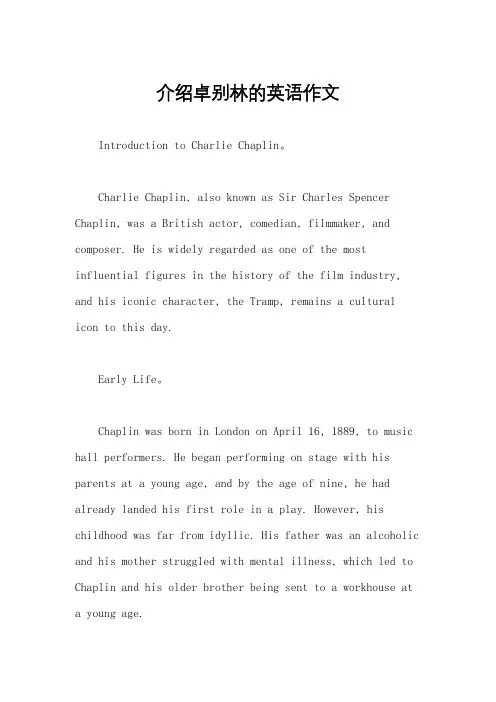
介绍卓别林的英语作文Introduction to Charlie Chaplin。
Charlie Chaplin, also known as Sir Charles Spencer Chaplin, was a British actor, comedian, filmmaker, and composer. He is widely regarded as one of the most influential figures in the history of the film industry, and his iconic character, the Tramp, remains a cultural icon to this day.Early Life。
Chaplin was born in London on April 16, 1889, to music hall performers. He began performing on stage with his parents at a young age, and by the age of nine, he had already landed his first role in a play. However, his childhood was far from idyllic. His father was an alcoholic and his mother struggled with mental illness, which led to Chaplin and his older brother being sent to a workhouse at a young age.Career。
Chaplin's big break came when he was signed to Keystone Studios in 1913. It was here that he created the character of the Tramp, a lovable but down-on-his-luck vagrant who became his most famous creation. The Tramp appeared in many of Chaplin's films, including "The Kid" (1921), "City Lights" (1931), and "Modern Times" (1936).Chaplin's films were hugely popular and he quickly became one of the biggest stars of the silent film era. However, his success was not without controversy. In the 1940s, he was accused of being a communist sympathizer and was forced to leave the United States. He eventuallysettled in Switzerland, where he lived until his death in 1977.Legacy。
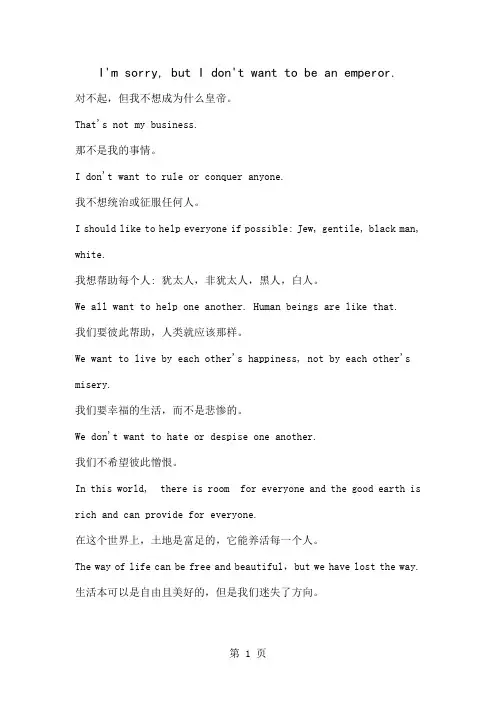
I'm sorry, but I don't want to be an emperor.对不起,但我不想成为什么皇帝。
That's not my business.那不是我的事情。
I don't want to rule or conquer anyone.我不想统治或征服任何人。
I should like to help everyone if possible: Jew, gentile, black man, white.我想帮助每个人: 犹太人,非犹太人,黑人,白人。
We all want to help one another. Human beings are like that.我们要彼此帮助,人类就应该那样。
We want to live by each other's happiness, not by each other's misery.我们要幸福的生活,而不是悲惨的。
We don't want to hate or despise one another.我们不希望彼此憎恨。
In this world, there is room for everyone and the good earth is rich and can provide for everyone.在这个世界上,土地是富足的,它能养活每一个人。
The way of life can be free and beautiful,but we have lost the way.生活本可以是自由且美好的,但是我们迷失了方向。
Greed has poisoned men's souls, has barricaded the world with hate, has goose-stepped us into misery and bloodshed.贪婪侵蚀了人们的灵魂,用憎恨阻隔了世界,我们一步步走向血腥。
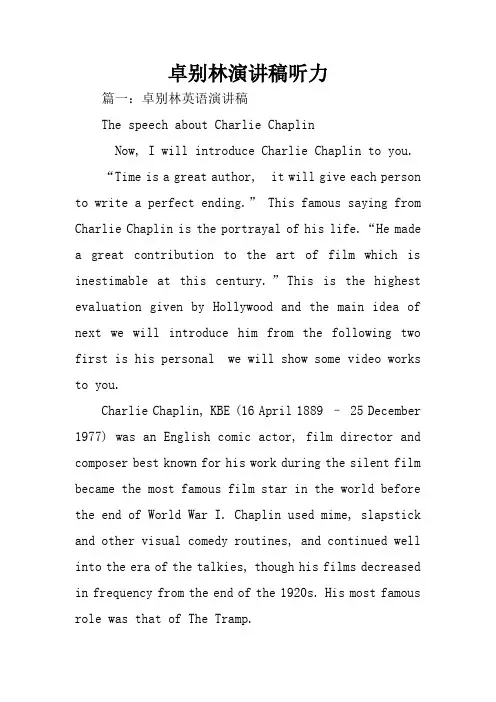
卓别林演讲稿听力篇一:卓别林英语演讲稿The speech about Charlie ChaplinNow, I will introduce Charlie Chaplin to you.“Time is a great author, it will give each person to write a perfect ending.” This famous saying from Charlie Chaplin is the portrayal of his life.“He made a great contribution to the art of film which is inestimable at this century.”This is the highest evaluation given by Hollywood and the main idea of next we will introduce him from the following two first is his personal we will show some video works to you.Charlie Chaplin, KBE (16 April 1889 – 25 December 1977) was an English comic actor, film director and composer best known for his work during the silent film became the most famous film star in the world before the end of World War I. Chaplin used mime, slapstick and other visual comedy routines, and continued well into the era of the talkies, though his films decreased in frequency from the end of the 1920s. His most famous role was that of The Tramp.The Tramp is a vagrant with the refined manners, cloths, and dignity of a gentleman. Chaplin, with his Tramp character, quickly became the most popular star and this popularity last over twenty years. He laid the foundation of modern comedy and “The Tramp”, Chaplin’s principal character also influenced other comedian to copy him later.is one of the representation films by Charlie Chaplin. This film shows Chaplin’s iconic little Tramp character struggling to survive in the modern, industrialized world. The film is a comment on the desperate employment and fiscal conditions many people faced during the great ideological content of this film is profound , and Chaplin’s acting reaches a high degree of excellence.The first talkie by Chaplin is . This film was act of defiance against Nazism and Hitler. It was a fearlessly performance for Chaplin Sr. who lived in a world shrouded in the darkness by political atmosphere. It discloses the ugliness of Nazism according to act a vivid role of jews. People can see how the Chaplin’s political view about by this film brightly.These films and his whole life bring us endless fun and deeply corresponds to the honor-----pioneering film artist and global personal charm contributes to his as his quote ,"To believe in yourself, this is the secret of success."篇二:卓别林无论多么遥远爱就在身边演讲稿无论多么遥远,爱就在身边I’m sorry, but I don’t want to be an emperor. That’s not my business. I don’t want to rule or conquer anyone.I should like to help everyone I possible. Jew, gentile, black man, white. We all want to help one another. Human beings are like that. We want to live by each other’s happiness, not by each other’s misery. We don’t want to hate and despise one another. In this world there’s room for everyone and the good earth in rich. And can provide for everyone. The way of life can be free and beautiful. But we have lost the way. Greed has poisoned men’s souls, has barricaded the world with hate, has goose-stepped us into misery and bloodshed. We have developed speed, but we have shut ourselves in. machinery that gives abundance has left us in want. Our knowledge has made us cynical; our cleverness, hard andunkind. We think too much and feel too little. More than machinery we need humanity. More than cleverness, we need kindness and gentleness. Without these qualities, life will be violent and all will be lost. The airplane and the radio have brought us closer together. The very nature of these inventions cries out for the goodness in man, cries for universe brotherhood. For the unity of us all. Even now my voice is reaching millions throughout the world, million of despairing men, women, and little children, victims of a system that makes men torture and imprison innocent people. To those who can hear me, I say: “do not despair.” The misery that is now upon us is but the passing of greed, the bitterness of men who fear the way of human progress; the hate of men will pass and dictators die, and the power they took from the people, will return to the people and so long as men die, liberty will never perish…..Soldiers don’t give yourselves to brutes, men who despite you, enslave you, who regiment your lives, tell you what to do, what to think and what to feel, who drill you, diet you, treat you like cattle, use you as cannon fodder! Don’t give yourselves to these unnatural men,machine men, with machine minds and ,machine hearts! Your are not machines! You are not cattle! You are men! You have the love of humanity in your hearts. You don’t hate, only the unloved hate, the unloved and unnatural. Soldiers, don’t fight for slavery, fight for liberty! In the seventeenth chapter of Saint Luke it is written the kingdom of god is within man, not one man, nor a group of men, but in all men, in you! You the people have the power, the power to create machines, the power to create happiness! You the people have the power to make this life free and beautiful, to make this life a wonderful adventure! Then in the name of democracy let us use that power, let us all unite!!! Let us fight for a new world, a decent world that will give men a chance to work, that will give you the future and old age and security. By the promise of these thinks, brutes have risen to power, but they lie! They do not fulfill their promise, they never will! Dictators free themselves but they enslave the people! Now let us fight to fulfill that promise! Let us fight to free the world, to do away with national barriers, to do away with greed, with hate and intolerance! Let us fight for a world ofreason, a world where science and progress will lead us to all men’s happiness. Soldiers, in the name of democracy, let us all unite!!!篇三:卓别林讲稿卓别林.演讲稿【】首先,很高兴站在这里和大家一起去分享自己对于卓别林的一个见解以及看法。
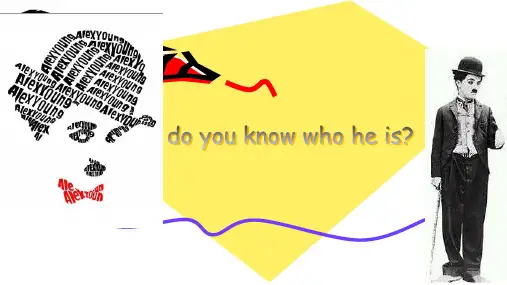
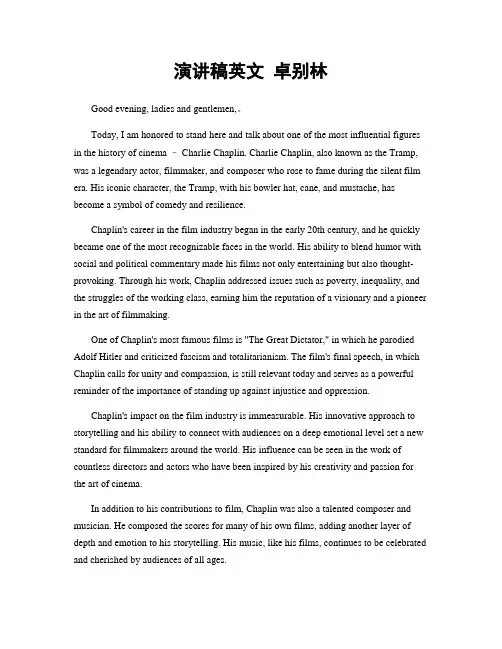
演讲稿英文卓别林Good evening, ladies and gentlemen,。
Today, I am honored to stand here and talk about one of the most influential figures in the history of cinema – Charlie Chaplin. Charlie Chaplin, also known as the Tramp, was a legendary actor, filmmaker, and composer who rose to fame during the silent film era. His iconic character, the Tramp, with his bowler hat, cane, and mustache, has become a symbol of comedy and resilience.Chaplin's career in the film industry began in the early 20th century, and he quickly became one of the most recognizable faces in the world. His ability to blend humor with social and political commentary made his films not only entertaining but also thought-provoking. Through his work, Chaplin addressed issues such as poverty, inequality, and the struggles of the working class, earning him the reputation of a visionary and a pioneer in the art of filmmaking.One of Chaplin's most famous films is "The Great Dictator," in which he parodied Adolf Hitler and criticized fascism and totalitarianism. The film's final speech, in which Chaplin calls for unity and compassion, is still relevant today and serves as a powerful reminder of the importance of standing up against injustice and oppression.Chaplin's impact on the film industry is immeasurable. His innovative approach to storytelling and his ability to connect with audiences on a deep emotional level set a new standard for filmmakers around the world. His influence can be seen in the work of countless directors and actors who have been inspired by his creativity and passion for the art of cinema.In addition to his contributions to film, Chaplin was also a talented composer and musician. He composed the scores for many of his own films, adding another layer of depth and emotion to his storytelling. His music, like his films, continues to be celebrated and cherished by audiences of all ages.In conclusion, Charlie Chaplin's legacy as a filmmaker, actor, and composer is truly remarkable. His ability to blend humor with social commentary, his fearless approach to storytelling, and his unwavering commitment to his craft have left an indelible mark on the world of cinema. As we continue to celebrate and study his work, we are reminded of the power of art to inspire, educate, and unite us all.Thank you.。
我最喜欢的名人卓别林英语作文I'm ready to craft a compelling and insightful long-form article about your favorite celebrity, Charlie Chaplin. I'll make sure to infuse the piece with emotional elements and utilize a rich vocabulary, including idiomatic expressions. Charlie Chaplin: A Timeless Icon of Laughter and Humanity He was a man of humble beginnings, born into the harsh realities of Victorian London's slums. Yet, from these inauspicious origins emerged a comedic genius who would captivate the world with his wit, charm, and poignant portrayals of the human condition. Charlie Chaplin, the iconic "Little Tramp," transcended cultural barriers and language divides to become one of the most beloved and enduring figures in cinematichistory. Chaplin's childhood was marked by poverty and hardship. His father, a struggling music hall entertainer, was largely absent, and his mother faced mental health challenges, leaving young Charlie and his brother Sydney to fend for themselves. The streets of London became their playground and their classroom, shaping Chaplin's keen observations of human nature and the struggles of theworking class. These experiences would later inform the depth and social commentary that infused his films. At the tender age of five, Chaplin steppedonto the stage, filling in for his mother during a music hall performance. This marked the beginning of a remarkable journey that would see him evolve from achild actor into a global superstar. He honed his comedic skills in vaudeville, mastering the art of physical humor and pantomime. His signature character, theLittle Tramp, with his ill-fitting suit, bowler hat, and cane, became an emblem of resilience and the indomitable human spirit. With the advent of cinema, Chaplin found his true calling. He possessed an innate understanding of the power ofvisual storytelling, and his films were masterpieces of comedic timing and pathos. From the slapstick brilliance of "The Kid" to the social satire of "Modern Times" and the poignant commentary on war and dictatorship in "The Great Dictator,"Chaplin's films not only entertained but also challenged audiences to confront societal issues and reflect on the human experience. Beyond his comedic genius, Chaplin was a visionary filmmaker who pushed the boundaries of cinematic art. He was a pioneer of independent filmmaking, establishing his own studio andmaintaining creative control over his work. He experimented with innovativetechniques, such as slow motion and close-ups, to enhance the emotional impact of his storytelling. His films were not merely silent comedies; they were profound explorations of love, loss, and the human spirit's triumph over adversity. Charlie Chaplin's legacy extends far beyond the silver screen. He was a true global icon, adored by millions around the world. His films continue to inspire and entertain audiences of all ages, transcending generations and cultural differences. His life story, a testament to the power of perseverance and the transformative nature of art, serves as a beacon of hope and inspiration for aspiring artists and dreamers everywhere. Idiomatic Expressions Humble beginnings (origin: Bible) - a background of poverty or obscurity Fend for themselves (origin: 16th century) - to take care of oneself without help from others Playground and classroom (origin: 19th century) - a place where one learns and gains experience Stepped onto the stage (origin: 17th century) - to begin a career in performing Honed his skills (origin: 14th century) - to sharpen or perfect one's abilities Master of his craft (origin: 16th century) - an expert in a particular skill or art Ill-fitting (origin: 19th century) - not fitting properly Emblem of resilience (origin: 16th century) - a symbol of the ability to recover from difficulties Found his calling (origin: 19th century) - discovered his true purpose in life Slapstick brilliance (origin:16th century) - a type of comedy based on exaggerated physical activity Social satire (origin: 18th century) - the use of humor to criticize society Poignant commentary (origin: 16th century) - a moving and thought-provoking observation Pushed the boundaries (origin: 20th century) - to explore the limits of what is possible Independent filmmaking (origin: 20th century) - making films outside the traditional studio system Creative control (origin: 20th century) - the power to make decisions about the artistic aspects of a work Silver screen (origin: 20th century) - the movie screen Global icon (origin: 20th century) - a person who is famous and admired worldwide Transcending generations (origin: 20th century) - appealing to people of all ages Beacon of hope (origin: 19th century) - a source of inspiration and optimism This is just a sample to give you an idea of the style and approach I can take.。
英语作文的卓别林Title: The Iconic Charlie Chaplin in English Composition。
Charlie Chaplin, the legendary figure in the realm of cinema, transcends time and language barriers with his timeless humor and profound social commentary. Born onApril 16, 1889, in London, England, Chaplin rose from humble beginnings to become one of the most influential figures in the history of film. His iconic character, the Tramp, remains etched in the collective memory of audiences worldwide. In this essay, we delve into the life, artistry, and enduring legacy of Charlie Chaplin.Chaplin's journey to stardom was fraught with challenges. Raised in poverty and deprived of a stable family life, he found solace in performing arts from a young age. His innate talent for pantomime and physical comedy soon caught the attention of theater impresarios, paving the way for his entry into the world ofentertainment.It was Chaplin's collaboration with Mack Sennett's Keystone Studios that catapulted him to fame. His debut as the Tramp in the silent film "Kid Auto Races at Venice" marked the beginning of a remarkable career. With his trademark bowler hat, cane, and distinctive walk, Chaplin brought to life a character that resonated with audiences across the globe.What set Chaplin apart was not just his comedic genius but also his ability to infuse his films with poignantsocial commentary. Through the lens of humor, he tackled themes such as poverty, inequality, and the dehumanizing effects of industrialization. In iconic works like "Modern Times" and "The Great Dictator," Chaplin fearlessly confronted pressing issues of his time, earning bothcritical acclaim and public admiration.Despite facing controversies and challenges, including accusations of communist sympathies during the McCarthy era, Chaplin remained unwavering in his commitment to his craftand his principles. His exile from the United States in the 1950s only served to amplify his status as a symbol of artistic integrity and resilience.Beyond his contributions to cinema, Chaplin was also a pioneer in the industry, venturing into directing, producing, and even composing music for his films. His creative vision extended beyond the confines of the silver screen, influencing generations of filmmakers and artists.Chaplin's personal life was as complex as his on-screen persona. His romantic dalliances, tumultuous marriages, and estranged relationships with his children added layers of intrigue to his public image. Yet, amidst the turbulence, Chaplin remained dedicated to his art, finding solace and redemption in his work.Today, decades after his passing in 1977, Chaplin's legacy endures. His films continue to entertain and inspire audiences worldwide, reminding us of the enduring power of laughter and the importance of speaking truth to power. From Hollywood to the halls of academia, Chaplin'sinfluence is felt across cultural landscapes, immortalizing him as not just a comedian but a cultural icon and a humanitarian.In conclusion, Charlie Chaplin's indelible mark on the world of cinema and beyond is a testament to the enduring power of creativity, resilience, and compassion. As we reflect on his life and legacy, we are reminded of the timeless wisdom and wit encapsulated in his immortal words: "Life is a tragedy when seen in close-up, but a comedy in long-shot."。
I'm sorry but I don't want to be an Emperor - that's not my business - I don't want to rule or conquer anyone. I should like to help everyone if possible, Jew, gentile, black man, white. We all want to help one another, human beings are like that. We want to live by each other's happiness, not by each other's misery. We don't want to hate and despise one another. In this world there is room for everyone and the good earth is rich and can provide for everyone. The way of life can be free and beautiful. But we have lost the way. Greed has poisoned men's souls - has barricaded the world with hate; has goose-stepped us into misery and bloodshed. We have developed speed but we have shut ourselves in: machinery that gives abundance has left us in want. Our knowledge has made us cynical, our cleverness hard and unkind. We think too much and feel too little: More than machinery we need humanity; More than cleverness we need kindness and gentleness. Without these qualities, life will be violent and all will be lost. The aeroplane and the radio have brought us closer together. The very nature of these inventions cries out for the goodness in men, cries out for universal brotherhood for the unity of us all. Even now my voice is reaching millions throughout the world, millions of despairing men, women and little children, victims of a system that makes men torture and imprison innocent people. To those who can hear me I say Do not despair. The misery that is now upon us is but the passing of greed, the bitterness of men who fear the way of human progress: the hate of men will pass and dictators die, and the power they took from the people, will return to the people and so long as men die, liberty will never perish...Soldiers - don't give yourselves to brutes, men who despise you, enslave you - who regiment your lives, tell you what to do, what to think and what to feel, who drill you, diet you, treat you like cattle, use you as cannon fodder!Don't give yourselves to these unnatural men, machine men, with machine minds and machine hearts! Y ou are not machines! Y ou are not cattle! Y ou are men! Y ou have the love of humanity in your hearts. Y ou don't hate - only the unloved hate - the unloved and the unnatural. Soldiers - don't fight for slavery, fight for liberty!In the seventeenth chapter of Saint Luke it is written the kingdom of God is within man - not one man, nor a group of men - but in all men - in you! Y ou the people have the power, the power to create machines, the power to create happiness! Y ou the people have the power to make this life free and beautiful, to make this life a wonderful adventure! Then in the name of democracy let us use that power - let us all unite!!! Let us fight for a new world, a decent world that will give men a chance to work, that will give you the future and old age and security. By the promise of these things, brutes have risen to power, but they lie! They do not fulfil their promise, they never will! Dictators free themselves but they enslave the people! Now let us fight to fulfil that promise! Let us fight to free the world, to do away with national barriers, to do away with greed, with hate and intolerance! Let us fight for a world of reason, a world where science and progress will lead to all men's happiness.Soldiers - in the name of democracy, let us all unite!!!。
关于喜剧演员卓别林介绍的英语作文全文共3篇示例,供读者参考篇1The Legendary Charlie Chaplin: A Cinematic Genius and a Figure of HopeCharlie Chaplin, a name that has become synonymous with the art of silent film and the enduring power of physical comedy. Born on April 16, 1889, in London, England, Chaplin's life was a remarkable journey from poverty and hardship to global fame and artistic acclaim. As a student, I have always been captivated by his ability to transcend language barriers and touch the hearts of millions with his timeless performances.Chaplin's early years were marked by the harsh realities of poverty. His father, a talented vaudeville performer, struggled with alcoholism, and his mother, a singer, battled mental illness. This tumultuous upbringing instilled in Chaplin a resilience and empathy that would later shape his artistry. At a young age, he took to the stage, performing in music halls and theaters, honing his skills and developing his unique comedic style.It was during his time with the Fred Karno comedy troupe that Chaplin truly found his niche. His iconic character, the "Little Tramp," was born – a downtrodden yet endearing figure, clad in a tattered suit, oversized shoes, and a distinctive mustache. This character embodied the struggles and aspirations of the common man, resonating with audiences across the globe.Chaplin's arrival in Hollywood in 1913 marked the beginning of a legendary career that would span decades. His first film appearance in the 1914 comedy short "Making a Living" was a modest start, but it laid the foundation for his meteoric rise. With each subsequent film, Chaplin's reputation grew, and his popularity soared.One of his most celebrated works, "The Kid," released in 1921, showcased Chaplin's remarkable ability to blend humor and pathos. The film's poignant storyline, which follows the Little Tramp's chance encounter with an abandoned child, tugged at the heartstrings of audiences worldwide. Chaplin's performance was a masterclass in physical comedy, evoking laughter and tears in equal measure.As the era of silent films drew to a close, Chaplin seamlessly transitioned into the world of talkies with his 1940 masterpiece, "The Great Dictator." This satirical comedy, in which he playedboth a Jewish barber and the dictator Adenoid Hynkel, was a daring and bold statement against the rise of fascism and antisemitism. Chaplin's brilliant parody of Adolf Hitler and his poignant plea for peace and humanity resonated profoundly, cementing his status as a true artist and social commentator.Throughout his career, Chaplin remained a fierce advocate for artistic freedom and social justice. His films often tackled complex themes, exploring the plight of the working class, the dangers of unchecked power, and the importance of human dignity. His unwavering commitment to his craft and his principles earned him both admiration and criticism, but he never wavered in his pursuit of truth and artistic expression.Perhaps Chaplin's most enduring legacy lies in his ability to bring joy and laughter to audiences around the world. His films transcended cultural and linguistic barriers, connecting with people on a universal level. The Little Tramp, with his endearing clumsiness and unwavering optimism, became a symbol of hope and resilience, reminding us that even in the darkest of times, there is room for laughter and humanity.As a student, I am constantly reminded of the power of art to inspire, educate, and unite. Chaplin's life and work serve as a testament to the transformative potential of cinema and theenduring impact of a single individual's vision. His films continue to captivate audiences, inspiring new generations of artists and thinkers to embrace their creativity and use their voices to bring about positive change.In a world often consumed by conflict and division, Chaplin's message of unity and compassion remains as relevant as ever. His ability to find humor in the most trying circumstances and to shine a light on the struggles of the marginalized has left an indelible mark on the cinematic landscape and the collective consciousness of society.As I reflect on Chaplin's extraordinary journey, I am filled with awe and admiration. From his humble beginnings to his status as a cultural icon, his life serves as a powerful reminder of the transformative power of perseverance, dedication, and artistic vision. Chaplin's legacy extends far beyond the realm of cinema; it is a testament to the enduring spirit of creativity, resilience, and the human capacity for empathy and understanding.In the end, Charlie Chaplin was more than just a comedic genius – he was a visionary artist, a social commentator, and a beacon of hope for countless individuals around the world. His films continue to inspire and delight, reminding us of theuniversal language of laughter and the unifying power of art. As a student, I am grateful for the opportunity to study and appreciate his extraordinary body of work, and I am forever inspired by his unwavering commitment to using his art as a catalyst for positive change.篇2The Immortal Tramp: Charlie Chaplin, the Comedy LegendCharlie Chaplin is a true icon of the entertainment world, a comedic genius whose legacy has transcended generations and captured the hearts of audiences worldwide. As a student of film and history, I have been captivated by Chaplin's remarkable life story and his unparalleled contribution to the art of comedy.Born on April 16, 1889, in London, England, Chaplin's early years were marked by poverty and hardship. His childhood was a tumultuous one, with his mother's mental illness and his father's absence forcing him and his brother to endure the harsh realities of life in the slums. It was during these formative years that Chaplin developed his keen observational skills and a deep empathy for the downtrodden, traits that would later become the cornerstone of his iconic character, the Little Tramp.Chaplin's foray into the world of entertainment began at a young age, as he took to the stage in various music hall performances to support his family. It was during these early years that his natural talent for physical comedy and mime was honed, laying the foundation for the legendary career that was to follow.In 1914, Chaplin's life took a pivotal turn when he signed with the Keystone Film Company and made his debut in the world of silent films. It was here that the iconic Little Tramp character was born – a lovable, downtrodden vagabond with a small mustache, baggy pants, and a cane, who captured the hearts of audiences with his endearing charm and poignant social commentary.Chaplin's genius lay in his ability to blend slapstick comedy with poignant social commentary, using his Little Tramp character as a vehicle to explore the complexities of human existence and the struggles of the working class. Films like "The Kid" (1921), "The Gold Rush" (1925), and "The Circus" (1928) not only showcased his impeccable timing and physical prowess but also his deep understanding of human emotions and the power of pathos.One of Chaplin's most celebrated works, "Modern Times" (1936), was a scathing critique of industrialization and the dehumanization of the working class. Through the lens of the Little Tramp, Chaplin masterfully satirized the harsh realities of the modern world while simultaneously eliciting laughter and empathy from his audience. It was a testament to his ability to seamlessly blend comedy with social commentary, a feat that few have been able to match.Beyond his comedic prowess, Chaplin was also a visionary filmmaker who pushed the boundaries of the art form. He was a pioneer in the use of camera techniques, editing, and storytelling, creating a cinematic language that was both innovative and influential. His films were not mere entertainments but works of art that challenged societal norms and explored the depths of the human condition.Chaplin's impact on the world of comedy is immeasurable. He inspired generations of comedians and filmmakers, from Buster Keaton to Jacques Tati, and his influence can still be seen in contemporary comedic works. His ability to transcend language and cultural barriers, to evoke laughter and tears with equal ease, is a testament to the universal appeal of his art.But Chaplin's legacy extends beyond the realm of entertainment. He was a vocal advocate for social justice and a champion of the underdog, using his platform to raise awareness about the plight of the working class and the need for political and social reform. His films were not mere escapism but a mirror held up to society, reflecting the harsh realities of the time while offering a glimmer of hope and resilience.In my studies, I have been particularly drawn to Chaplin's unwavering commitment to his craft and his uncompromising artistic vision. Despite facing numerous obstacles, including political persecution and financial struggles, he remained steadfast in his pursuit of artistic excellence, refusing to compromise his values or dilute his message.As a student of film and comedy, I am constantly in awe of Chaplin's ability to evoke such a wide range of emotions through his minimalist approach. His performances were a masterclass in physical comedy, with every gesture, every movement, every facial expression meticulously crafted to elicit laughter and pathos. His ability to convey complex emotions without uttering a single word is a testament to his profound understanding of the human condition and the power of non-verbal communication.Chaplin's influence extends far beyond the realm of film and comedy. He was a true Renaissance man, a multifaceted artist who excelled in various disciplines, from composing music to writing and directing. His legacy serves as an inspiration to artists of all kinds, reminding us of the power of creativity, perseverance, and unwavering dedication to one's craft.In today's world, where laughter and joy seem fleeting, Chaplin's work serves as a beacon of hope and a reminder of the healing power of comedy. His films continue to resonate with audiences across generations, transcending cultural and linguistic barriers, and reminding us of the universality of human experiences.As a student, I am deeply grateful for the opportunity to study and appreciate the work of such a legendary figure. Chaplin's life and art have taught me invaluable lessons about resilience, creativity, and the power of laughter to bring people together. His legacy inspires me to approach my own pursuits with the same passion, dedication, and unwavering commitment to artistic excellence.In conclusion, Charlie Chaplin was more than just a comedian; he was a visionary artist, a social commentator, and a true humanitarian. His impact on the world of entertainment andbeyond cannot be overstated. Through his iconic Little Tramp character, he gave voice to the voiceless and shined a light on the struggles of the working class, reminding us of the enduring power of laughter and empathy. As I continue my studies and pursue my own creative endeavors, Chaplin's life and work will forever serve as a guiding light, inspiring me to push boundaries, challenge societal norms, and use my art as a force for positive change.篇3The Tramp Who Made the World Laugh: A Look at the Life and Legacy of Charlie ChaplinWhen you hear the name Charlie Chaplin, one image immediately comes to mind - the iconic little tramp with a bowler hat, bamboo cane, and awkward waddle. With his quirky mustache and ill-fitting clothes, this character created an unforgettable presence on the silent film screen. However, behind the comedic genius that brought smiles to millions was a complex man whose life was marked by immense talent, hardship, controversy, and an unwavering passion for his art.Born on April 16, 1889 in London, Charlie Chaplin entered the world in incredibly humble circumstances. His childhood wasclouded by the dark realities of poverty - his father was an unpredictable artist who eventually abandoned the family, while his mother struggled with mental illness and was committed to an asylum when Charlie was just nine years old. With his family life in shambles, the young Chaplin turned to entertaining on the streets of London as a means of survival, singing songs and performing comedy sketches to earn a few coins.It was this harsh upbringing that shaped Chaplin's comedic sensibilities and brought depth to the iconic "Little Tramp" character he later manifested on the screen. The tramp, dressed in tattered clothes and down on his luck, resonated with audiences as he became a symbol of the struggles faced by the impoverished and the perpetual underdog who kept bouncing back from adversity. As film historian Mark Cousins puts it, "The tramp is still magic because he represents human hopes born out of poverty and pain."Chaplin's meteoric rise in the entertainment world began with his introduction to vaudeville at age 10, where he toured with comic opera troupes and quickly developed his skills in physical comedy and pantomime. It was the perfect launchpad for his transition to silent films in 1914, as he joined the KeystoneFilm Company and starred in comedic shorts showcasing his gift for slapstick humor and impeccable comedic timing.However, it wasn't until 1915 that Chaplin stepped into the role that would elevate him to international stardom – his first appearance as the lovable Little Tramp in the film "The Tramp." With his instantly recognizable costume, the little fellow with the toothbrush mustache and signature walk captivated audiences around the world with his ability to find humor and tenderness even in the direst of circumstances. Chaplin's skill in combining slapstick with pantomime and subtle gestures created a depth to his comedy that transcended language barriers and cultural divides.Over the next 25 years, Chaplin churned out dozens of iconic films, each one a masterpiece of physical comedy and social commentary. From "The Kid" (1921), where he played a tendering father figure to an abandoned child, to the satirical "The Great Dictator" (1940) which boldly mocked Adolf Hitler and the rise of Nazism, Chaplin used his comedic talents to explore the human condition and shine a light on societal issues that often went unspoken.Perhaps his most celebrated work was "Modern Times" (1936), a brilliant commentary on the dehumanizing effects ofindustrialization and mass production. With scenes of Chaplin being literally swallowed by the machinations of a factory assembly line, the film captured the anxieties of a rapidly modernizing world while still finding moments of pure hilarity.Beyond his prodigious body of work on the screen, Chaplin was a trailblazer who fought for artistic control and freedom of expression at a time when studios tried to reign in creative talents. His founding of United Artists in 1919, alongside Douglas Fairbanks and others, gave him an independence rarely afforded to filmmakers of that era. Chaplin could craft his films with minimal oversight, infusing them with bold political messages and social critiques that would have been unthinkable under the tight control of major studios.Yet, Chaplin's life was not without immense controversy and hardship. His personal life, marked by multiple marriages and paternity scandals, was often front-page news. Additionally, his left-leaning political views, connections to communist sympathizers, and pacifist stances during World War II led to him being labeled a subversive by the U.S. government during the paranoia of the McCarthyism era. This culminated in Chaplin being denied re-entry into the United States in 1952 while traveling abroad – an event that left the 63-year old iconessentially exiled from the country that had brought him lasting fame.Chaplin spent his final 25 years living as an ex-patriot in Switzerland, occasionally appearing on television and receiving a lifetime achievement award from the Academy in 1972. Even in his twilight years, the "Little Tramp" commanded immense adoration from fans. Upon his death in 1977 at age 88, the world mourned a true cinematic legend and an artist who had brought incomparable joy and laughter to countless lives.Looking at Chaplin's profound legacy nearly 50 years after his passing, it's clear that his impact extends far beyond the comedic realms of cinema. Through the Little Tramp, he gave the world an enduring symbol representing the resilience and hopefulness of the human spirit in the face of adversity. At a time when silent films were considered a fleeting novelty, Chaplin's genius elevated the artform and set a benchmark for physical comedy and storytelling that few have matched.Equally vital was Chaplin's role as a social commentator – his films bravely held a mirror up to society, satirizing authoritarianism, inequality, and the ethical pitfalls of modernity in a way that still resonates today. German poet and playwright Bertolt Brecht spoke for many when he described the brillianceof Chaplin's craft: "The man lie laughed at was capital itself –social injustice, false ethics, hypocrisy. He made a ceaseless battle against this and on behalf of man's laughter."So while the Little Tramp may have been a man of few words, his message of hope, perseverance, and using humor as a tool for social commentary still rings loudly in the 21st century. Whether falling into an ingenious slapstick routine or boldly mocking the forces of fascism and oppression, Charlie Chaplin and his iconic character remain timeless symbols of joy, community, and the transformative power of comedy.。
卓别林英文介绍作文英文:Charlie Chaplin, also known as "The Tramp," was a legendary actor, director, and producer in the early days of Hollywood. He was born in London, England in 1889 and began his career in the entertainment industry at a young age. Chaplin's signature character, The Tramp, was a lovable and comical figure who captured the hearts of audiences around the world. He starred in and directed many iconic films, such as "City Lights," "Modern Times," and "The Great Dictator."Chaplin's talent and creativity extended beyond acting and directing. He was also a gifted composer and wrote the music for many of his films. In addition, he was a pioneer in the film industry, using innovative techniques and technologies to create groundbreaking movies.Despite his success, Chaplin faced many challengesthroughout his life. He was accused of being a communist during the height of the Cold War and was forced to leave the United States. However, he continued to make films and was eventually honored with numerous awards and accolades, including an Academy Award for Lifetime Achievement.Overall, Charlie Chaplin was a true icon of the entertainment industry. His legacy lives on through his timeless films and his influence on future generations of filmmakers.中文:查理·卓别林,也被称为“小流浪汉”,是好莱坞早期的传奇演员、导演和制片人。
life story of卓别林英语作文Title: The Enchanting Life Story of Charlie ChaplinCharlie Chaplin, a name synonymous with comedy and cinema, remains a legendary figure in the history of filmmaking. Born in London on April 16, 1889, into a family of entertainers, Chaplin's journey to fame was fraught with challenges yet filled with remarkable achievements.As a child, Chaplin's life was far from ordinary. His parents separated shortly after his birth, and he spent his early years living in poverty with his mother. Despite the hardships, Chaplin displayed a natural talent for performing, often entertaining his family and neighbors with his antics. At the age of five, he made his first stage appearance, a foreshadowing of the illustrious career that awaited him.As Chaplin grew, he became increasingly involved in the theater, performing in various vaudeville acts. His unique physicality and comic timing soon gained him recognition, and he soon found himself touring the country, entertaining thousands with his hilarious performances.In 1913, Chaplin made his foray into the fledgling film industry with a role in the short film "Making a Living."It was here that Chaplin's genius truly shone, as he began to experiment with the medium, infusing it with his trademark humor and pathos. His most famous character, the Tramp, emerged during this period, a hapless yet charming figure who captured the hearts of audiences worldwide.With each film, Chaplin's fame grew, and he soon became one of the most recognizable faces in cinema. His films, such as "The Gold Rush," "The Circus," and "Modern Times," not only showcased his comic talents but also delved into deeper themes of loneliness, loss, and the struggles of the common man. Chaplin's ability to evoke both laughter and tears in his audience was truly remarkable.Despite his success, Chaplin's personal life was often tumultuous. His relationships with women were often complex and fraught, and he married four times, each marriage ending in divorce. However, these personal struggles did not dim his creativity or his impact on the film industry. Chaplin's later years were marked by both triumph and controversy. His films continued to be popular, and hereceived numerous honors and accolades for hiscontributions to cinema. However, Chaplin's political views and his support for communism during the Cold War era caused him to be blacklisted in the United States, effectively ending his career in Hollywood.Despite this, Chaplin refused to compromise his beliefs and continued to make films in Europe. His later works, such as "A King in New York" and "Burlesque," displayed his undiminished talent and his willingness to tackle controversial subjects.In 1972, Chaplin was awarded an honorary Academy Award for his "incalculable effect in making motion pictures the art form of this century." This recognition, coming late in his life, was a fitting tribute to a man who had revolutionized the art of filmmaking and entertained generations with his unique humor and humanity.Charlie Chaplin died in Switzerland on December 25, 1977, leaving behind a legacy that will forever be remembered. His films continue to be watched and admired, and his influence on comedy and cinema is unmistakable. Chaplin's life story is not only one of success and famebut also of resilience and perseverance, a testament to the power of talent and determination in overcoming the challenges of life.In conclusion, Charlie Chaplin's life was a remarkable journey that spanned the globe and transformed the art of filmmaking. His unique humor, pathos, and unwavering commitment to his beliefs made him a legend in his own time and an inspiration to generations that followed. Chaplin's legacy will forever be remembered, not only for his contributions to cinema but also for the way he lived his life with courage, humor, and authenticity.。
The speech about Charlie Chaplin
Now, I will introduce Charlie Chaplin to you.
“Time is a great author, it will give each person to write a perfect ending.” This famous saying from Charlie Chaplin is the portrayal of his life.“He made a great contribution to the art of film which is inestimable at this century.”This is the highest evaluation given by Hollywood and the main idea of us.The next we will introduce him from the following two aspects.The first is his personal introduction.Then we will show some video works to you.
Charlie Chaplin, KBE (16 April 1889 – 25 December 1977) was an English comic actor, film director and composer best known for his work during the silent film era.He became the most famous film star in the world before the end of World War I. Chaplin used mime, slapstick and other visual comedy routines, and continued well into the era of the talkies, though his films decreased in frequency from the end of the 1920s. His most famous role was that of The Tramp.
The Tramp is a vagrant with the refined manners, cloths, and dignity of a gentleman. Chaplin, with his Tramp character, quickly became the most popular star and this popularity last over twenty years. He laid the foundation of modern comedy and “The Tramp”, Chaplin’s principal character also influenced other comedian to copy him later.
<Modern Time> is one of the representation films by Charlie Chaplin. This film shows Chaplin’s iconic little Tramp character struggling to survive in the modern, industri alized world. The film is a comment on the desperate employment and fiscal conditions many people faced during the great depression.The ideological content of this film is profound , and Chaplin’s acting reaches a high degree of excellence.
The first talkie by Chaplin is <The Great Dictator>. This film was act of defiance against Nazism and Hitler. It was a fearlessly performance for Chaplin Sr. who lived in a world shrouded in the darkness by political atmosphere. It discloses the ugliness of Nazism according to act a vivid role of jews. People can see how the Chaplin’s political view about by this film brightly.
These films and his whole life bring us endless fun and deeply thinking.He corresponds to the honor-----pioneering film artist and global celebrity.The personal charm contributes to his achievement.Just as his quote ,"To believe in yourself, this is the secret of success."。